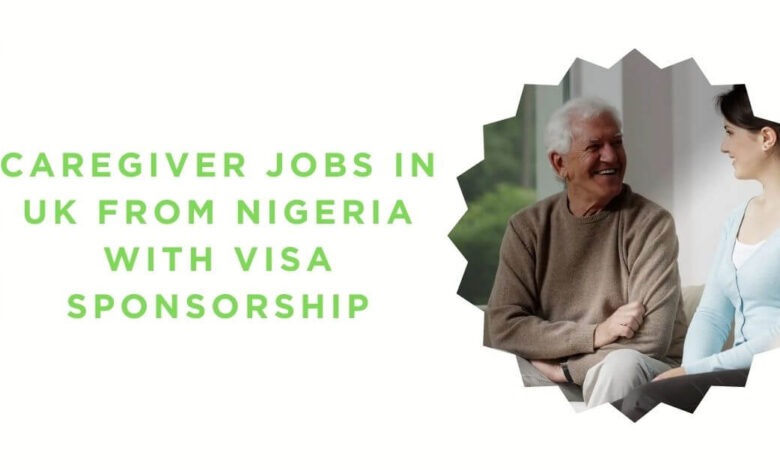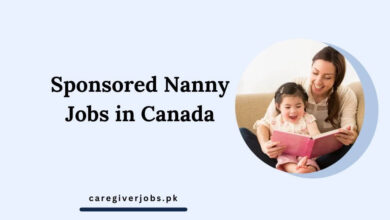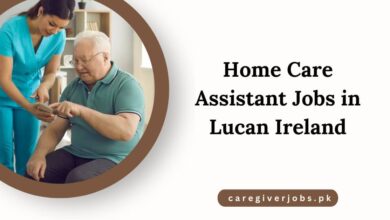
Caregiver Jobs in UK from Nigeria with Visa Sponsorship 2025
The demand for caregivers in the United Kingdom (UK) continues to rise, making it a promising career path for individuals worldwide, including Nigeria. Caregiving is a meaningful and rewarding profession, and with visa sponsorship opportunities, Nigerian caregivers can legally work in the UK healthcare sector.
This guide provides an overview of available visa-sponsored caregiver jobs, application procedures, job categories, benefits, training, and more.
Check Also: Care Assistant Jobs in UK with Tier 2 Visa Sponsorship
Understanding Visa Sponsorship:
Visa sponsorship allows foreign nationals to obtain a UK work visa, legally securing employment in the healthcare sector. Caregivers can apply for different visas, such as the Health and Care Worker Visa (formerly Tier 2 General Visa) or the Tier 5 (Youth Mobility Scheme) Visa. Each visa type has specific requirements, making it crucial to choose the most suitable one.
Benefits:
- Employment Stability: High demand for caregivers ensures stable job opportunities.
- Visa Sponsorship: Ensures legal employment and compliance with immigration laws.
- Career Development: Opportunities to gain experience, specialized skills, and managerial roles.
- Financial Stability: Competitive salaries with potential overtime pay.
- International Work Experience: Enhances your resume and skillset.
- Cultural Exchange: Engages caregivers in meaningful social interactions.
- Supportive Work Environment: Employers offer training and assistance.
- Healthcare Benefits: Some employers provide medical insurance.
- Networking Opportunities: Expands professional connections for future career growth.
Requirements:
Candidates must meet specific qualifications, including:
- Educational Qualifications: Healthcare-related diplomas, certifications, or degrees.
- Work Experience: Prior caregiving experience is preferred.
- Language Proficiency: English language skills are required (IELTS or equivalent may be needed).
- Medical Examinations: Includes TB screening and general health checks.
- Background Checks: A criminal record check is mandatory.
Caregiver Visa Requirements in Nigeria:
To apply for a caregiver visa from Nigeria, candidates need:
- Valid Nigerian Passport
- Job Offer or Acceptance Letter from a UK employer
- Educational Certificates and Proof of Experience
- Medical Clearance (e.g., Tuberculosis Test)
- English Language Proficiency Test (if required)
- Police Clearance Certificate
- Financial Proof to Support Initial Stay
- COVID-19 Vaccination Certificate (if required)
- Completed Visa Application Forms and Fees
Caregiver Job Opportunities in the UK:
Caregivers in the UK can work in various settings, including:
- Home Caregiver (Domiciliary Carer): Assisting clients in their homes.
- Residential Caregiver: Providing care in nursing or care homes.
- Specialist Caregiver: Supporting individuals with disabilities, dementia, or mental health needs.
- Child Caregiver: Providing care for children in homes or childcare facilities.
- Live-in Carer: Living with and assisting a client full-time.
- Agency Caregiver: Working through agencies across various settings.
Steps to Secure Caregiver Jobs in UK from Nigeria with Visa Sponsorship 2025:
- Research Visa Sponsorship Programs: Identify suitable opportunities that match your qualifications.
- Prepare Required Documents: Gather education certificates, work experience proof, and references.
- Update Your CV and Cover Letter: Highlight relevant experience and skills.
- Apply for Jobs: Submit applications to employers and agencies offering visa sponsorship.
- Attend Interviews: Be prepared for competency-based and practical caregiving assessments.
- Secure Job Offer & Visa Sponsorship: Upon selection, complete visa sponsorship procedures with your employer.
- Submit Visa Application: Apply through the UK government’s official immigration portal.
Interview Preparation Tips:
- Research the employer and job role.
- Practice common interview questions.
- Demonstrate passion and caregiving experience.
- Showcase communication and problem-solving skills.
Training and Support:
Upon arrival, caregivers undergo orientation and additional training in:
- Medication management
- First aid and CPR
- Specialized care techniques (e.g., dementia care)
- Health and safety protocols
- Professional development programs
Salary and Compensation:
Caregivers in the UK earn competitive wages depending on experience and location. Benefits may include:
- Pension plans
- Paid leave
- Health insurance
- Accommodation and transport support (for some roles)
Rights and Responsibilities:
Caregivers have rights under UK labor laws, including fair pay, safe working conditions, and paid time off. Responsibilities include:
- Providing quality care and support to clients.
- Promoting client independence and dignity.
- Maintaining accurate care records.
Work-Life Balance as a Caregiver:
Maintaining well-being is crucial. Caregivers should:
- Manage stress through self-care.
- Take breaks and personal time.
- Build a support network among colleagues and friends.
Challenges and Rewards of Being a Caregiver:
Challenges: Emotional strain, physical exhaustion, cultural adjustments. Rewards: Personal satisfaction, meaningful client relationships, career growth.
Support and Training for Career Growth:
Ongoing professional development is available through:
- Online courses
- Workshops and seminars
- Certification programs
Success Stories from Nigerian Caregivers in the UK:
Many Nigerian caregivers have successfully secured rewarding careers in the UK, benefiting from stable jobs, career progression, and a supportive work environment.
Conclusion:
The UK caregiving sector offers excellent opportunities for Nigerians seeking stable employment through visa sponsorship. By meeting qualifications, preparing thoroughly, and applying strategically, aspiring caregivers can build a successful and fulfilling career in the UK.
For More Info:
Email Your CV, and We’ll Find the Best Pathway For you: info@caregiverjobs.pk
Frequently Asked Questions:
How can I get a caregiver job in the UK from Nigeria?
To work in the UK, non-residents will typically need to secure a visa. The most common one for caregiver roles is the Health and Care Worker visa, previously known as the Tier 2 (General) visa. Those who have received a job offer in the UK’s healthcare sector are eligible for this visa.
Can I apply for a job in the UK from Nigeria?
You can apply for all UK work visas online. With mitigating circumstances, you can apply in person at your local immigration office or with our team in Lagos if you live in Nigeria.
How do I get a UK certificate of sponsorship for a caregiver?
Obtaining the CoS mainly lies in the hands of your NHS trust; they must apply for the CoS and then provide information, such as your job role and salary. To complete this, the trust must obtain a sponsor license, and fortunately, most NHS trusts are recognized as A-rated sponsors.




